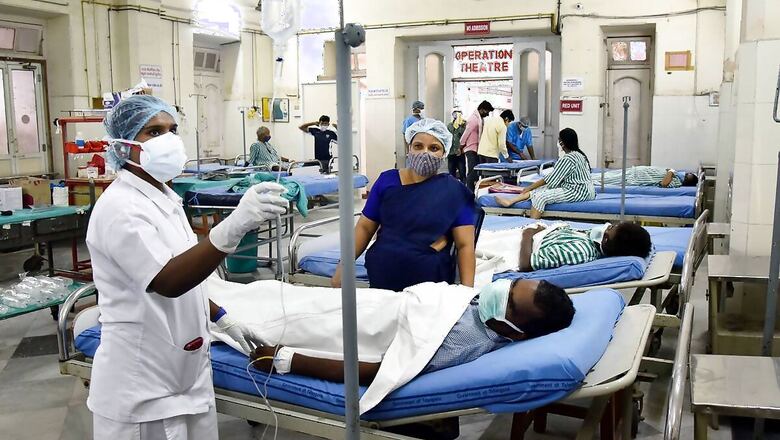Black Fungus: As India Reports Over 7K Cases, Know All Latest Updates on the Deadly Fungal Infection

views
The cases of mucormycosis, or what is commonly known as the black fungus, are on the rise in India with over 7,000 cases and more than 200 deaths being reported from across the country amid the COVID-19 pandemic. The Union government had on Thursday urged states and Union Territories to make mucormycosis or black fungus a notifiable disease under the Epidemic Diseases Act, stating that the infection is leading to prolonged morbidity and mortality among COVID-19 patients. A notifiable disease is required by law to be reported to the government authorities. The collection of information allows the authorities to monitor the disease and provides early warning of possible outbreaks.
Black Fungus Cases and Deaths in India
Mucormycosis has infected at least 7,250 persons and killed at least 219, according to estimates shared with The Hindustan Time by officials. The highest number of cases of the Covid-triggered fungal infection and deaths due to it has been recorded in Maharashtra, followed by Gujarat and Madhya Pradesh.
Gujarat has reported 1,163 cases and 61 deaths whereas Madhya Pradesh has recorded 575 infections and 31 deaths, as per the HT report. Haryana recorded 268 cases and eight deaths while Delhi has reported 203 cases and one death. In Uttar Pradesh, 169 cases of black fungus and eight deaths due to it were reported. Bihar recorded 103 cases and 2 deaths while Chhattisgarh saw 101 infections and one death. Karnataka reported 97 cases and no death, Telangana has 90 cases and 10 deaths, as per the HT report.
States That Declared Black Fungus as Epidemic
The governments of Tamil Nadu, Rajasthan, Odisha, Telangana, Assam and Delhi on Thursday declared mucormycois as a notifiable disease under Epidemic Diseases Act 1897 after a number of people were found to be infected with the disease in these states leading deaths in several cases. Earlier in the day, the Telangana government said all government and private health facilities shall follow guidelines for screening, diagnosis and management of Black Fungus by the Union Health Ministry and Indian Council of Medical Research. “It is also made mandatory for all government and private health facilities to report all suspected and confirmed cases to Health Department,” the notification said.
Rajasthan Chief Minister Ashok Gehlot said the black fungus infection was notified an epidemic as the state government is required to have complete details of patients suffering from it. About 100 patients are affected by the infection.
Tamil Nadu Health Secretary J Radhakrishnan said the advantage of announcing black fungus as a notifiable disease was that all hospitals would immediately inform the government if they come across such cases, enabling the administration know which place or district was reporting more such numbers.
Amphotericin-B: Drug Used to Treat Black Fungus
The Union Health Ministry on Friday said license has been given to five more manufactures for production of Amphotericin-B, used in the treatment of black fungus, and they will start producing 1,11,000 vials of the drug per month from July. The five manufacturers which have been given the license to produce the Amphotericin-B within the country are NATCO Pharmaceuticals, Hyderabad, Alembic Pharmaceuticals, Vadodara, Gufic Biosciences Ltd, Gujarat, Emcure Pharmaceuticals, Pune and Lyka in Gujarat. There are five existing manufacturers of Amphotericin-B in the country and one importer — Bharat Serums & Vaccines Ltd, BDR Pharmaceuticals Ltd, Sun Pharma Ltd, Cipla Ltd, Life Care Innovations and Mylan Labs (importer).
Availability of Amphotericin-B
As several states and union territories report an increasing number Mucormycosis cases there is also a reported shortage of Amphotericin-B, the ministry said. Efforts are being made to supplement the domestic availability of the anti-fungal drug through import, the health ministry said, adding that 3,63,000 vials of Amphotericin-B will be imported in May, resulting in the total availability of 5,26,752 vials (inclusive of the domestic production) in the country. It said 3,15,000 vials will be imported in June and along with the domestic supply, the countrywide availability of Amphotericin-B will be enhanced to 5,70,114 vials in June.
What Happened Today
Delhi Health Minister Satyendar Jain on Friday said there were 197 cases of mucormycosis in hospitals across Delhi till Wednesday night, including non-residents who have come to the city for treatment. Jain said there is an acute shortage of Amphotericin-B injections used in the treatment of black fungus in the entire country. The Centre is likely to provide 2,000 injections to Delhi, which will then be given to hospitals. Meanwhile, the West Bengal government said it is trying to formulate a set of guidelines to tackle mucormycosis, which, up until Thursday, has infected six persons. Goa has also recorded six cases of mucormycosis so far.
Four people from Damoh and Balaghat districts in Madhya Pradesh died of Mucormycosis on, a dangerous fungal infection seen in some COVID-19 patients and those who had recovered, officials said on Friday. The Chief Medical and Health Officers of Damoh and Balaghat, Sangeeta Trivedi and Dr Manoj Pandey, admitted that their districts did not have Amphetericin-B injections used to treat black fungus patients.
The Uttar Pradesh government will declare black fungus as a notifiable disease under the Epidemic Diseases Act later in the day, a senior official said after Chief Minister Yogi Adityanath issued directions in this regard. So far, around 300 COVID patients suffering from black fungus have been admitted to hospitals in the state. Puducherry Lt Governor Tamilisai Soundararajan on Friday said 20 people including a couple of government staff were affected by Mucormycorsis in the union territory and were receiving treatment. The territorial administration would soon issue a notification to declare black fungus a notifiable disease, she said.
About the Black Fungus
As the country witnesses a rising number of mucormycosis cases amid the COVID-19 pandemic, AIIMS Director Dr Randeep Guleria said there is a need to aggressively work on preventing the fungal infection. He said that cases of fungal infection will probably come down as the COVID-19 cases decrease.
Speaking on the origin of the term ‘black fungus’, he said, “The most important thing to remember is that mucormycosis is not a black fungus. It is a misnomer… because there is some discolouration of skin as it decreases blood supply, it may give a feeling that the area has become black, that is why the name has come.”
Further explaining the cause behind mucormycosis and what can be done to prevent it, Guleria said, “If one is having steroids for a long period of time or has underlying predisposing condition like diabetes, the person is predisposed to many fungal infections, one that is being seen more commonly is mucormycosis…which is predominantly involving the synuses, the eye and at times it can go on to the brain and have nasal involvement. There have been some reports of pulmonary mucormycosis.”
“There are people who are at a high risk, they need to be careful about sugar control. We have to be very careful about use of steroid. Not using it early because there is data which suggests that early use of steroids predisposes to secondary infection, both bacterial and fungal. And also the doses and duration of steroids need to be closely monitored because that itself also predisposes. The viral infection itself, presence of diabetes and use of steroids all need to be closely monitored if you need to prevent this from happening,” Guleria told CNN-News18.
Read all the Latest News, Breaking News and Coronavirus News here. Follow us on Facebook, Twitter and Telegram.




















Comments
0 comment